formerly eScholarship Editions


|
|
|
|
Your request for similar items found 20 book(s). | Modify Search | Displaying 1 - 20 of 20 book(s) | |
| 1. | 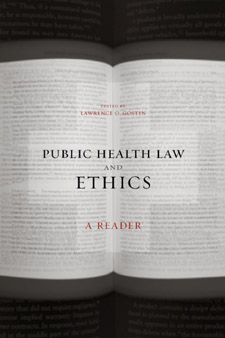 | Title: Public health law and ethics: a reader Author: Gostin, Larry O. (Larry Ogalthorpe) Published: University of California Press, 2002 Subjects: Law | Medicine | Health Care Publisher's Description: This incisive selection of government reports, scholarly articles, and court cases is designed to illuminate the ethical, legal, and political issues in the theory and practice of public health. A companion to the internationally acclaimed Public Health Law: Power, Duty, Restraint, this collection encourages debate and discourse about how courts, scholars, and policy makers respond to the salient legal and ethical dilemmas. The excerpts and commentaries in the reader analyze the legal and constitutional foundations of public health, juxtaposing them with the emerging importance of public health ethics and human rights. The book offers a systematic account of public health law, ethics, and human rights in promoting the common good. Gostin provides thoughtful commentary on the field of public health and carefully explains the meaning and importance of each selection. Scholars, legislators, and public health professionals, as well as faculty and students in schools of law, public health, medicine, nursing, government, and health administration, will benefit from the contemporary case studies covering a wide range of topics from bioterrorism to public health genetics. [brief] Similar Items |
| 2. | 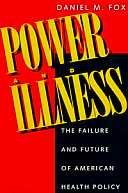 | Title: Power and illness: the failure and future of American health policy Author: Fox, Daniel M Published: University of California Press, 1993 Subjects: Sociology | Medicine | History | American Studies | United States History Publisher's Description: During most of this century, American health policy has emphasized caring for acute conditions rather than preventing and managing chronic illness - even though chronic illness has caused most sickness and death since the 1920s. In this provocative and wide-ranging book, Daniel Fox explains why this has been so and offers a forceful argument for fundamental change in national health care priorities.Fox discusses how ideas about illness and health care, as well as the power of special interest groups, have shaped the ways in which Americans have treated illness. Those who make health policy decisions have increased support for hospitals, physicians, and medical research, believing that people then would become healthier. This position, implemented at considerable cost, has not adequately taken into account the growing burden of chronic disabling illness. While decision makers may have defined chronic disease as a high priority in research, they have not given it such a priority in the financing of health services.The increasing burden of chronic illness is critical. Fox suggests ways to solve this problem without increasing the already high cost of health care - but he does not underestimate the difficulties in such a strategy. Advocating the redistribution of resources within hospital and medical services, he targets those that are redundant or marginally effective.There could be no more timely subject today than American health care. And Daniel Fox is uniquely able to address its problems. A historian of medicine, with knowledge of how hospitals and physicians behave and how health policy is made at government levels, he has extensively researched published and unpublished documents on health care. What he proposes could profoundly affect all Americans. [brief] Similar Items |
| 3. |  | Title: Policies, plans, & people: foreign aid and health development Author: Justice, Judith Published: University of California Press, 1989 Subjects: Anthropology | Art and Architecture Publisher's Description: Judith Justice uses an interdisciplinary approach to show how anthropologists and planners can combine their expertise to make health care programs culturally compatible with the populations they serve. Similar Items |
| 4. | 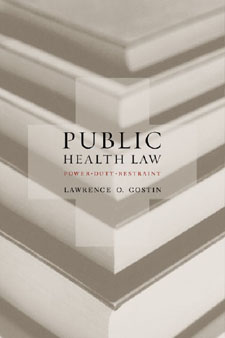 | Title: Public health law: power, duty, restraint Author: Gostin, Larry O. (Larry Ogalthorpe) Published: University of California Press, 2001 Subjects: Law | Medicine | Public Policy Publisher's Description: Gostin's timely book offers the first systematic definition and theory of public health law. Basing his definition on a broad notion of the government's inherent responsibility to advance the population's health and well-being, he develops a rich understanding of the government's fundamental powers and duties. By analyzing constitutional powers and limits, as well as statutory, administrative, and tort law, Public Health Law vividly shows how law can become a potent tool for the realization of a healthier and safer population. [brief] Similar Items |
| 5. |  | Title: Lives at risk: public health in nineteenth-century Egypt Author: Kuhnke, LaVerne Published: University of California Press, 1990 Subjects: Anthropology | Medical Anthropology Publisher's Description: Lives at Risk describes the introduction of Western medicine into Egypt. The two major innovations undertaken by Muhammad Ali in the mid-nineteenth century were a Western-style school of medicine and an international Quarantine Board. The ways in which these institutions succeeded and failed will greatly interest historians of medicine and of modern Egypt. And because the author relates her narrative to twentieth-century health issues in developing countries, Lives at Risk will also interest medical and social anthropologists.The presence of the quarantine establishment and the medical school in Egypt resulted in a rudimentary public health service. Paramedical personnel were trained to provide primary health care for the peasant population. A vaccination program effectively freed the nation from smallpox. But the disease-oriented, individual-care practice of medicine derived from the urban hospital model of industrializing Europe was totally incompatible with the health care requirements of a largely rural, agrarian population. [brief] Similar Items |
| 6. | 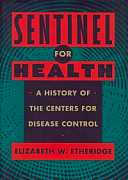 | Title: Sentinel for health: a history of the Centers for Disease Control Author: Etheridge, Elizabeth W Published: University of California Press, 1992 Subjects: History | Medicine Publisher's Description: In the only history of its kind, Etheridge traces the development of the Centers for Disease Control from its inception as a malaria control unit during World War II through the mid-1980s . The eradication of smallpox, the struggle to identify an effective polio vaccine, the unraveling of the secrets of Legionnaires' disease, and the shock over the identification of the HIV virus are all chronicled here. Drawing on hundreds of interviews and source documents, Etheridge vividly recreates the vital decision-making incidents that shaped both the growth of this institution as well as the state of public health in this country for the last five decades.We follow the development of the institution as it was transformed by the will and the imagination of remarkable individuals such as Dr. Joseph Mountin, one of the first heads of the CDC. Often characterized as abrasive and impatient, Mountin pushed the CDC to become a vital player in eradicating the threat of communicable disease in the United States. Others such as Dr. Andrew Langmuir brought the expertise necessary to establish epidemiology as one of the primary functions of the CDC.Created to serve the states and to answer any call for help whether routine or extraordinary, the CDC is now widely recognized as one of the world's premier public health institutions. [brief] Similar Items |
| 7. | 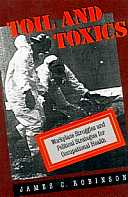 | Title: Toil and toxics: workplace struggles and political strategies for occupational health Author: Robinson, James C. (James Claude) 1953- Published: University of California Press, 1991 Subjects: Environmental Studies | Labor Studies | Sociology | Public Policy | Economics and Business Similar Items |
| 8. | 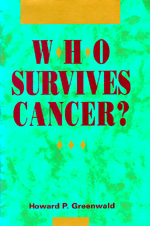 | Title: Who survives cancer? Author: Greenwald, Howard P Published: University of California Press, 1992 Subjects: Sociology | Environmental Studies | Medicine Publisher's Description: FACT OR FICTION? *A white male earning over $35,000 a year has a better chance of surviving most types of cancer than an unemployed African-American male.*Psychological factors predispose people to contracting cancer and improved emotional health promotes recovery.*Early detection is useless in curing cancer.*Experimental, not conventional, treatments offer the most benefits and longer survival rates to cancer patients.*A scientific breakthrough of practical and immediate significance in cancer treatment is imminent.*Cancer prevention is ineffective in many areas and campaigns will probably never achieve a reduction of cancer mortality approaching 50 percent.*Health Maintenance Organizations (HMOs) increase survival chances for most cancer patients.Howard Greenwald takes an incisive new look at how class, race, sex, psychological state, type of health care and available treatments affect one's chance of surviving cancer. Drawing on an original ten-year survival study of cancer patients, he synthesizes medical, epidemiological, and psychosocial research in a uniquely interdisciplinary and eye-opening approach to the question of who survives cancer and why.Scientists, health care professionals, philanthropists, government agencies, and ordinary people all agree that significant resources must be allocated to fight this dreaded disease. But what is the most effective way to do it? Greenwald argues that our priorities have been misplaced and calls for a fundamental rethinking of the way the American medical establishment deals with the disease. He asserts that the emphasis on prevention and experimental therapy has only limited value, whereas the availability of conventional medical care is very important in influencing cancer survival. Class and race become strikingly significant in predicting who has access to health care and can therefore obtain medical treatment in a timely, effective manner. Greenwald counters the popular notion that personality and psychological factors strongly affect survival, and he underscores the importance of early detection. His research shows that Health Maintenance Organizations, while sometimes prone to delays, offer low-income patients a better chance of ultimate survival. Greenwald pleads for immediate attention to the inadequacies and inequalities in our health care delivery system that deter patients from seeking regular medical care.Instead of focusing on research and the hope for a breakthrough cure, Greenwald urges renewed emphasis on ensuring available health care to all Americans. In its challenge to the thrust of much biomedical research and its critique of contemporary American health care, as well as in its fresh and often counterintuitive look at cancer survival, Who Survives Cancer? is invaluable for policymakers, health care professionals, and anyone who has survived or been touched by cancer. [brief] Similar Items |
| 9. | 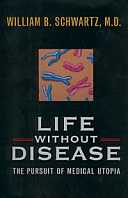 | Title: Life without disease: the pursuit of medical utopia Author: Schwartz, William B 1922- Published: University of California Press, 1998 Subjects: Science | Medicine | Economics and Business | History and Philosophy of Science | Public Policy Publisher's Description: The chaotic state of today's health care is the result of an explosion of effective medical technologies. Rising costs will continue to trouble U.S. health care in the coming decades, but new molecular strategies may eventually contain costs. As life expectancy is dramatically extended by molecular medicine, a growing population of the aged will bring new problems. In the next fifty years genetic intervention will shift the focus of medicine in the United States from repairing the ravages of disease to preventing the onset of disease. Understanding the role of genes in human health, says Dr. William B. Schwartz, is the driving force that will change the direction of medical care, and the age-old dream of life without disease may come close to realization by the middle of the next century. Medical care in 2050 will be vastly more effective, Schwartz maintains, and it may also be less expensive than the resource-intensive procedures such as coronary bypass surgery that medicine relies on today.Schwartz's alluring prospect of a medical utopia raises urgent questions, however. What are the scientific and public policy obstacles that must be overcome if such a goal is to become a reality? Restrictions on access imposed by managed care plans, the corporatization of charitable health care institutions, the increasing numbers of citizens without health insurance, the problems with malpractice insurance, and the threatened Medicare bankruptcy - all are the legacy of medicine's great progress in mastering the human body and society's inability to assimilate that mastery into existing economic, ethical, and legal structures. And if the average American life span is 130 years, a genuine possibility by 2050, what social and economic problems will result?Schwartz examines the forces that have brought us to the current health care state and shows how those same forces will exert themselves in the decades ahead. Focusing on the inextricable link between scientific progress and health policy, he encourages a careful examination of these two forces in order to determine the kind of medical utopia that awaits us. The decisions we make will affect not only our own care, but also the system of care we bequeath to our children. [brief] Similar Items |
| 10. | 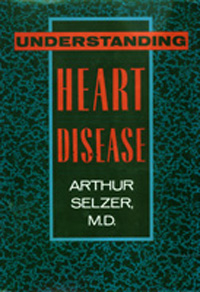 | Title: Understanding heart disease Author: Selzer, Arthur Published: University of California Press, 1992 Subjects: Medicine | Science Publisher's Description: Diseases of the heart are the leading cause of death in the Western world. Health professionals and the general public alike eagerly watch advances in the prevention, diagnosis, and treatment of heart disease. Yet the more spectacular aspects of medical progress in the field are often reported prematurely and their potential benefits exaggerated.Written in clear, accessible language, this book presents an authoritative and balanced picture of how heart diseases are recognized and managed. From his many years of experience, Dr. Selzer believes a well-informed patient can cooperate more successfully with a physician, and his book includes information vital to anyone confronting heart problems and cardiac emergencies. [brief] Similar Items |
| 11. | 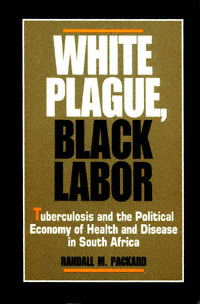 | Title: White plague, black labor: tuberculosis and the political economy of health and disease in South Africa Author: Packard, Randall M 1945- Published: University of California Press, 1989 Subjects: Anthropology | Medicine | Medical Anthropology | African Studies | Politics Publisher's Description: Why does tuberculosis, a disease which is both curable and preventable, continue to produce over 50,000 new cases a year in South Africa, primarily among blacks? In answering this question Randall Packard traces the history of one of the most devastating diseases in twentieth-century Africa, against the background of the changing political and economic forces that have shaped South African society from the end of the nineteenth century to the present. These forces have generated a growing backlog of disease among black workers and their families and at the same time have prevented the development of effective public health measures for controlling it. Packard's rich and nuanced analysis is a significant contribution to the growing body of literature on South Africa's social history as well as to the history of medicine and the political economy of health. [brief] Similar Items |
| 12. | 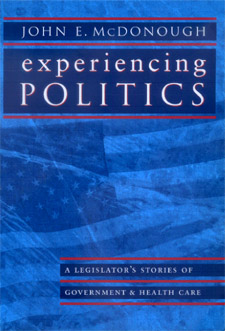 | Title: Experiencing politics: a legislator's stories of government and health care Author: McDonough, John E. (John Edward) Published: University of California Press, 2000 Subjects: Politics | Public Policy | Medicine Publisher's Description: John E. McDonough affords a rare glimpse into the practice of state politics in this insider's account of the fascinating interface between political science and real-life politics. A member of the Massachusetts House of Representatives for thirteen years and a skilled storyteller, McDonough eloquently weaves together stories of politics and policy with engaging theoretical models in a way that illuminates both the theory and the practice. By providing a link between scholarship and the world of experience, he communicates much about the essence of representative democracy. In the process, he demonstrates how politics extend beyond the public sphere into many aspects of life involving diverse values and interests. McDonough describes the nature of conflict, the role of interests, agenda setting, the nature and pace of change, the use of language, and more. Accessible, insightful, and original, his stories touch on a broad range of issues - including health care politics, campaigns, and elections; a street gang called the X-men; the death penalty; campaign finance reform, and tenants versus landlords. To the author, politics is everywhere and political dynamics are universal. While the setting for this book is one legislature, the lessons and insights are intended for everyone. [brief] Similar Items |
| 13. |  | Title: Healing the masses: Cuban health politics at home and abroad Author: Feinsilver, Julie Margot Published: University of California Press, 1993 Subjects: Latin American Studies | Politics | Medicine | Public Policy Publisher's Description: How has Cuba, a small, developing country, achieved its stunning medical breakthroughs? Hampered by scarce resources and a long-standing U.S. embargo, Cuba nevertheless has managed to provide universal access to health care, comprehensive health education, and advanced technology, even amid desperate economic conditions. Moreover, Cuba has sent disaster relief, donations of medical supplies and technology, and cadres of volunteer doctors throughout the world, emerging, in Castro's phrase, as a "world medical power."In her significant and timely study, Julie Feinsilver explores the Cuban medical phenomenon, examining how a governmental obsession with health has reaped medical and political benefits at home and abroad. As a result of Cuba's forward strides in health care, infant mortality rates are low even by First World standards. Cuba has successfully dealt with the AIDS epidemic in a manner that has aroused controversy and that some claim has infringed on individual liberties - issues that Feinsilver succinctly evaluates.Feinsilver's research and travel in Cuba over many years give her a unique perspective on the challenges Cuba faces in this time of unprecedented economic and political uncertainty. Her book is a must-read for everyone concerned with health policy, international relations, and Third World societies. [brief] Similar Items |
| 14. |  | Title: Deceit and denial: the deadly politics of industrial pollution Author: Markowitz, Gerald E Published: University of California Press, 2002 Subjects: Medicine | Health Care | Public Policy | United States History Publisher's Description: Deceit and Denial details the attempts by the chemical and lead industries to deceive Americans about the dangers that their deadly products present to workers, the public, and consumers. Gerald Markowitz and David Rosner pursued evidence steadily and relentlessly, interviewed the important players, investigated untapped sources, and uncovered a bruising story of cynical and cruel disregard for health and human rights. This resulting exposé is full of startling revelations, provocative arguments, and disturbing conclusions--all based on remarkable research and information gleaned from secret industry documents. This book reveals for the first time the public relations campaign that the lead industry undertook to convince Americans to use its deadly product to paint walls, toys, furniture, and other objects in America's homes, despite a wealth of information that children were at risk for serious brain damage and death from ingesting this poison. This book highlights the immediate dangers ordinary citizens face because of the relentless failure of industrial polluters to warn, inform, and protect their workers and neighbors. It offers a historical analysis of how corporate control over scientific research has undermined the process of proving the links between toxic chemicals and disease. The authors also describe the wisdom, courage, and determination of workers and community members who continue to voice their concerns in spite of vicious opposition. Readable, pathbreaking, and revelatory, Deceit and Denial provides crucial answers to questions of dangerous environmental degradation, escalating corporate greed, and governmental disregard for its citizens' safety and health. [brief] Similar Items |
| 15. | 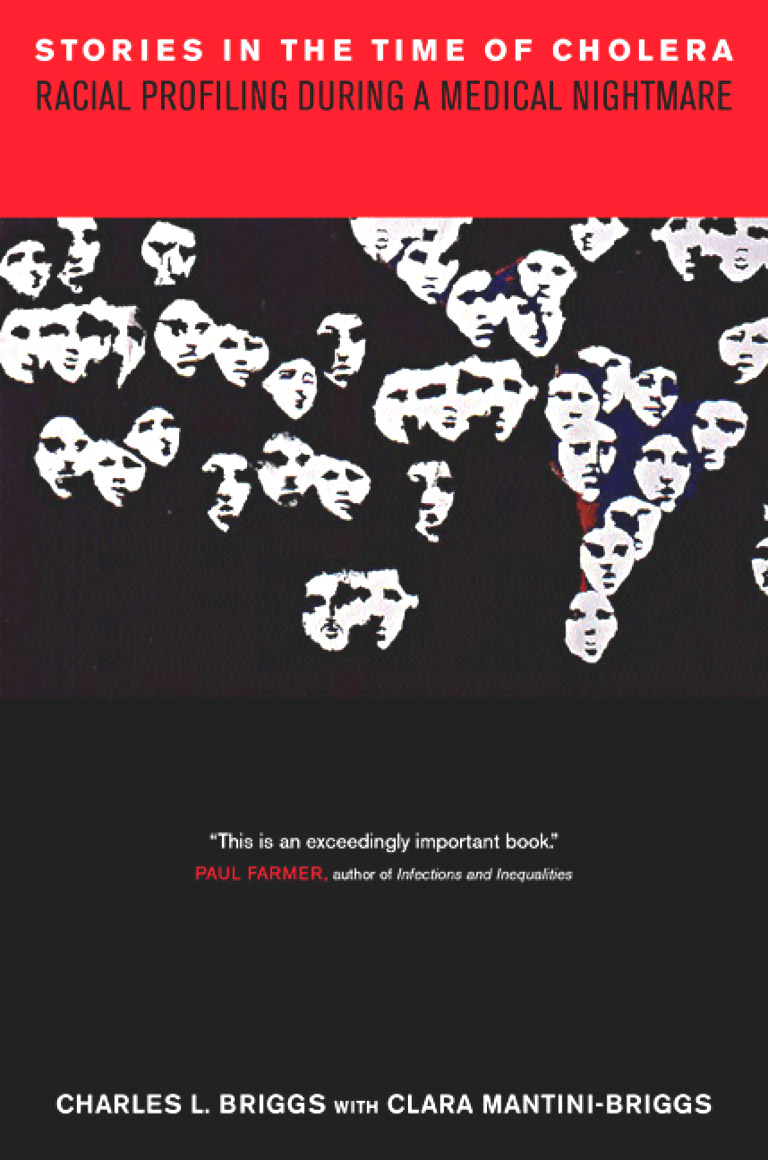 | Title: Stories in the time of cholera: racial profiling during a medical nightmare Author: Briggs, Charles L 1953- Published: University of California Press, 2003 Subjects: Anthropology | Latin American Studies | Ethnic Studies | Disease | Medical Anthropology Publisher's Description: Cholera, although it can kill an adult through dehydration in half a day, is easily treated. Yet in 1992-93, some five hundred people died from cholera in the Orinoco Delta of eastern Venezuela. In some communities, a third of the adults died in a single night, as anthropologist Charles Briggs and Clara Mantini-Briggs, a Venezuelan public health physician, reveal in their frontline report. Why, they ask in this moving and thought-provoking account, did so many die near the end of the twentieth century from a bacterial infection associated with the premodern past? It was evident that the number of deaths resulted not only from inadequacies in medical services but also from the failure of public health officials to inform residents that cholera was likely to arrive. Less evident were the ways that scientists, officials, and politicians connected representations of infectious diseases with images of social inequality. In Venezuela, cholera was racialized as officials used anthropological notions of "culture" in deflecting blame away from their institutions and onto the victims themselves. The disease, the space of the Orinoco Delta, and the "indigenous ethnic group" who suffered cholera all came to seem somehow synonymous. One of the major threats to people's health worldwide is this deadly cycle of passing the blame. Carefully documenting how stigma, stories, and statistics circulate across borders, this first-rate ethnography demonstrates that the process undermines all the efforts of physicians and public health officials and at the same time contributes catastrophically to epidemics not only of cholera but also of tuberculosis, malaria, AIDS, and other killers. The authors have harnessed their own outrage over what took place during the epidemic and its aftermath in order to make clear the political and human stakes involved in the circulation of narratives, resources, and germs. [brief] Similar Items |
| 16. | 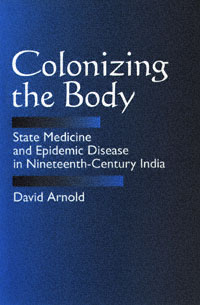 | Title: Colonizing the body: state medicine and epidemic disease in nineteenth-century India Author: Arnold, David 1946- Published: University of California Press, 1993 Subjects: Asian Studies | South Asia | Asian History | Medicine | History Publisher's Description: In this innovative analysis of medicine and disease in colonial India, David Arnold explores the vital role of the state in medical and public health activities, arguing that Western medicine became a critical battleground between the colonized and the colonizers.Focusing on three major epidemic diseases - smallpox, cholera, and plague - Arnold analyzes the impact of medical interventionism. He demonstrates that Western medicine as practiced in India was not simply transferred from West to East, but was also fashioned in response to local needs and Indian conditions.By emphasizing this colonial dimension of medicine, Arnold highlights the centrality of the body to political authority in British India and shows how medicine both influenced and articulated the intrinsic contradictions of colonial rule. [brief] Similar Items |
| 17. | 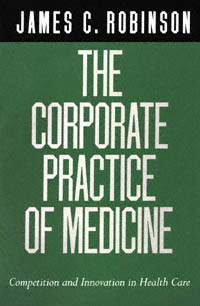 | Title: The corporate practice of medicine: competition and innovation in health care Author: Robinson, James C 1953- Published: University of California Press, 1999 Subjects: Politics | Public Policy | Medicine | Economics and Business Publisher's Description: One of the country's leading health economists presents a provocative analysis of the transformation of American medicine from a system of professional dominance to an industry under corporate control. James Robinson examines the economic and political forces that have eroded the traditional medical system of solo practice and fee-for-service insurance, hindered governmental regulation, and invited the market competition and organizational innovations that now are under way. The trend toward health care corporatization is irreversible, he says, and it parallels analogous trends toward privatization in the world economy.The physician is the key figure in health care, and how physicians are organized is central to the health care system, says Robinson. He focuses on four forms of physician organization to illustrate how external pressures have led to health care innovations: multispecialty medical groups, Independent Practice Associations (IPAs), physician practice management firms, and physician-hospital organizations. These physician organizations have evolved in the past two decades by adopting from the larger corporate sector similar forms of ownership, governance, finance, compensation, and marketing.In applying economic principles to the maelstrom of health care, Robinson highlights the similarities between competition and consolidation in medicine and in other sectors of the economy. He points to hidden costs in fee-for-service medicine - overtreatment, rampant inflation, uncritical professional dominance regarding treatment decisions - factors often overlooked when newer organizational models are criticized.Not everyone will share Robinson's appreciation for market competition and corporate organization in American health care, but he challenges those who would return to the inefficient and inequitable era of medicine from which we've just emerged. Forcefully written and thoroughly documented, The Corporate Practice of Medicine presents a thoughtful - and optimistic - view of a future health care system, one in which physician entrepreneurship is a dynamic component. [brief] Similar Items |
| 18. |  | Title: Smallpox: the fight to eradicate a global scourge Author: Koplow, David A 1951- Published: University of California Press, 2003 Subjects: Politics | American Studies | Public Policy | Disease Publisher's Description: Though smallpox was eradicated from the planet two decades ago, recent terrorist acts have raised the horrific possibility that rogue states, laboratories, or terrorist groups are in possession of secret stockpiles of the virus that causes the disease, and may be preparing to unleash it on target populations. Because it is a far deadlier killer than other biological warfare agents such as anthrax, and because the universal vaccination against smallpox was halted decades ago, a smallpox attack today would be nothing short of catastrophic. This clear, authoritative study looks at the long and fascinating history of the virus, with an informative overview of the political, biological, environmental, medical, and legal issues surrounding the question of whether or not the virus should be exterminated. The only two known samples of the virus are currently stored in Atlanta and Russia. The World Health Organization has repeatedly scheduled their destruction - an action that would rid the planet of all publicly acknowledged smallpox strains forever. Opponents of this plan argue that by destroying these last samples we are denying the possibility that this unique virus could be turned to beneficial purposes in basic scientific research. Others see the stockpile as part of a deterrent against future germ attacks. Proponents of prompt eradication argue that scientists have already learned all they can from this particular virus, and that by destroying the stockpile we are preventing it from ever falling into the wrong hands. As a thirty-year veteran of arms control issues, David Koplow is uniquely suited to provide readers with an informed and well-considered understanding of the complexities involved in the handling of this deadly virus. [brief] Similar Items |
| 19. |  | Title: Big doctoring in America: profiles in primary care Author: Mullan, Fitzhugh Published: University of California Press, 2002 Subjects: Medicine | Health Care | Sociology Publisher's Description: The general practitioner was once America's doctor. The GP delivered babies, removed gallbladders, and sat by the bedsides of the dying. But as the twentieth century progressed, the pattern of medical care in the United States changed dramatically. By the 1960s, the GP was almost extinct. The later part of the twentieth century, however, saw a rebirth of the idea of the GP in the form of primary care practitioners. In this engrossing collection of oral histories and provocative essays about the past and future of generalism in health care, Fitzhugh Mullan - a pediatrician, writer, and historian - argues that primary care is a fascinating, important, and still endangered calling. In conveying the personal voices of primary care practitioners, Mullan sheds light on the political and economic contradictions that confront American medicine. Mullan interviewed dozens of primary care practitioners - family physicians, internists, pediatricians, nurse practitioners, and physician assistants - asking them about their lives and their work. He explains how, during the last forty years, the primary care movement has emerged built on the principles of "big doctoring"--coordinated, comprehensive care over time. This book is essential reading for understanding core issues of the current health care dilemma. As our country struggles with managed care, market reforms, and cost containment strategies in medicine, Big Doctoring in America provides an engrossing and illuminating look at those in the trenches of the profession. [brief] Similar Items |
| 20. | 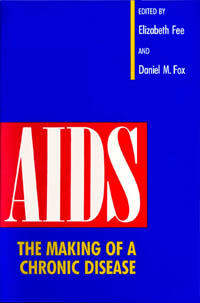 | Title: AIDS: the making of a chronic disease Author: Fee, Elizabeth Published: University of California Press, 1991 Subjects: History | Medicine | United States History | Sociology Publisher's Description: When AIDS was first recognized in 1981, most experts believed that it was a plague, a virulent unexpected disease. They thought AIDS, as a plague, would resemble the great epidemics of the past: it would be devastating but would soon subside, perhaps never to return. By the middle 1980s, however, it became increasingly clear that AIDS was a chronic infection, not a classic plague.In this follow-up to AIDS: The Burdens of History , editors Elizabeth Fee and Daniel M. Fox present essays that describe how AIDS has come to be regarded as a chronic disease. Representing diverse fields and professions, the twenty-three contributors to this work use historical methods to analyze politics and public policy, human rights issues, and the changing populations with HIV infection. They examine the federal government's testing of drugs for cancer and HIV, and show how the policy makers' choice of a specific historical model (chronic disease versus plague) affected their decisions. A powerful photo essay reveals the strengths of women from various backgrounds and lifestyles who are coping with HIV. A sensitive account of the complex relationships of the gay community to AIDS is included. Finally, several contributors provide a sampling of international perspectives on the impact of AIDS in other nations. [brief] Similar Items |